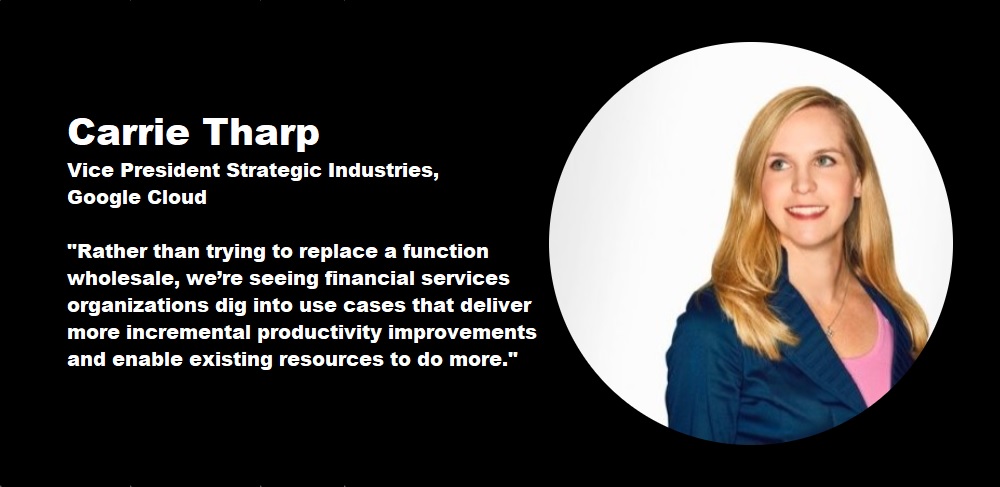
Generative AI has gone from a futuristic idea to a key business strategy, changing industries with practical uses while boosting efficiency and customer engagement. However, we see most use cases in the financial services industry currently focusing on cost savings and efficiency rather than new revenue generation.
an article written by Carrie Tharp – Vice President Strategic Industries, Google Cloud
It’s hard to imagine that we started the year off at a point where generative AI was still more fantasy than fact. We’ve gone from experimentation to seeing hundreds of gen AI agents come to life in the real world. While it’s evident the gen AI revolution is in full swing — it’s still a work in progress. According to a new National Research Group study, “The ROI of Gen AI,” commissioned by Google Cloud, roughly a third of all organizations are still evaluating or testing gen AI use cases.
Gen AI is more than integrating a new technology tool, it’s a powerful business differentiator. As such, there are many considerations to take into account, from what models to choose and how to measure success to navigating cultural changes related to ways of working and organizational structure. Now, more than ever, executives are being challenged to build winning AI strategies that enable their organizations to capitalize on the current and future potential of gen AI.
A big part of this process will be recognizing the value that gen AI brings to your specific industry and understanding how it connects back to the core value chain of your business. Throughout the year, my conversations have frequently involved questions around how to identify practical use cases that add genuine business value. While executives and business leaders understand the broader applications of gen AI, which I discussed earlier this year, they want more clarity about the primary use cases being pursued in their industry and the top areas where gen AI is already boosting bottom lines.
To get answers, I asked our Google Cloud industry leaders about what’s happening now and next with gen AI across retail, healthcare, financial services, and media & entertainment. In these conversations, there were five trends that emerged: our customers are taking advantage of multimodal AI, building AI agents, using AI-powered search, building AI-powered customer experiences, and they’re working on strategies for deepfake defense.
Hopefully, sharing some of these perspectives can help shed light on the use cases bringing immediate value in your industry and the outlook for longer-term transformation in the coming months and years.
Financial services
As a historically data-rich, insight-poor industry, the financial services industry stands to gain huge benefits in the future from using gen AI to unlock value in areas like fraud detection, risk management, and customer service. However, there are many existing challenges that must be addressed around regulatory compliance, governance, and data privacy to realize this potential. As a result, we see most use cases in the industry currently focusing on cost savings and efficiency rather than new revenue generation.
Most organizations have achieved early success by using gen AI to deliver productivity gains. This includes implementing AI agents and AI-powered search to drive faster and more accurate responses to customer inquiries, accelerate incident response by detecting critical fraud alerts faster, and empower employees to work faster, smarter, and more effectively. Rather than trying to replace a function wholesale, we’re seeing financial services organizations dig into use cases that deliver more incremental productivity improvements and enable existing resources to do more.
Zac Maufe, global head of regulated industries at Google Cloud, views this trend as a reaction to the ad hoc approaches utilized during the early rush to adopt and experiment with gen AI. Many organizations are realizing they will need to have a strong understanding of how gen AI can accelerate and integrate into day-to-day tasks to maximize its impact. For example, an investment banker doing market research needs to do more than summarize information from documents with gen AI, they need to generate summaries in a specific template to truly speed up their workflow.
“What everybody’s waking up to is that gen AI is a different way of working, so how you develop this technology has to be done in a more holistic approach,” Maufe said. “Gen AI isn’t bolted on as an extra thing. To use it, you have to tailor it a bit to how people are working.”
In the long term, Maufe believes gen AI will emerge as a key building block to develop products and services that can provide financial advice and guidance, tailored for the customer. As financial institutions have increasingly transitioned towards a self-service reality, they have struggled to achieve the same amount of sales and levels of personalization previously possible when serving customers in person. Here, gen AI shows great promise for transforming customer experiences, especially online, making it easier for customers to manage accounts and navigate more complex questions like planning for retirement or selecting a mortgage loan to purchase a property.
Though exciting, Maufe notes that these transformational capabilities will take some time to build and navigate with regulatory bodies, saying, “There’s a lot of regulatory scrutiny around data privacy and explainability, and getting data into a format that’s ready for use cases continues to be a challenge. Ultimately, driving revenue is more the next frontier. It’s not going to take decades, but it won’t happen overnight either.”
Read the article in full here: AI’s impact on industries in 2025
Banking 4.0 – „how was the experience for you”
„To be honest I think that Sinaia, your conference, is much better then Davos.”
Many more interesting quotes in the video below: